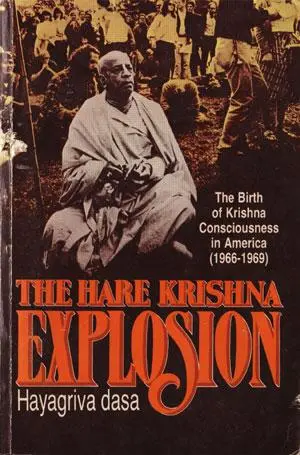This last week we harvested some of the honey from our bee hives, and as we extracted it I was in awe of its beautiful golden color. After we offered some of it to the Lord, we sampled its taste and it was amazing, not of this world. They must be devotee bees’s gathering the nectar from the lotus flowers and rose gardens at Srila Prabhupada’s Palace of Gold, here at New Vrindavan. The taste and texture was other-worldly, and remarkable. So I thought I would take a moment to to find some references on honey from Srila Prabhupada’s Books.
The pure devotees are always hankering after the lotus feet of the Lord. The lotus has a kind of honey which is transcendentally relished by the devotees. They are like the bees who are always after the honey. Śrīla Rūpa Gosvāmī, the great devotee ācārya of the Gauḍīya-Vaiṣṇava-sampradāya, has sung a song about this lotus honey, comparing himself to the bee:
“O my Lord Kṛṣṇa, I beg to offer my prayers unto You. My mind is like the bee, and it is after some honey. Kindly, therefore, give my bee-mind a place at Your lotus feet, which are the resources for all transcendental honey.” (SB 1.11.26)
When the Lord entered the forest of Vṛndāvana, all the inhabitants of the forest, both animate and inanimate, were eager to receive Him. He saw that the flowers of the forest, all fully blossoming, were weeping in ecstasy, honey flowing down their petals. The waterfalls on the hilly rocks were gladly flowing, and one could hear sweet sounds from the caves nearby. (Light of the Bhagavata text 24)
Srimad Bhagavatam
By His Divine Grace A.C. Bhaktivedanta Swami Prabhupada
Canto 1, Chapter 16, Text 6
athavāsya padāmbhoja-
makaranda-lihāṁ satām
kim anyair asad-ālāpair
āyuṣo yad asad-vyayaḥ
athavā—otherwise; asya—of His (Lord Kṛṣṇa’s); pada-ambhoja—lotus feet; makaranda-lihām—of those who lick the honey from such a lotus flower; satām—of those who are to exist eternally; kim anyaiḥ—what is the use of anything else; asat—illusory; ālāpaiḥ—topics; āyuṣaḥ—of the duration of life; yat—that which is; asat-vyayaḥ—unnecessary waste of life.
TRANSLATION
The devotees of the Lord are accustomed to licking up the honey available from the lotus feet of the Lord. What is the use of topics which simply waste one’s valuable life?
PURPORT
Lord Kṛṣṇa and His devotees are both on the transcendental plane; therefore the topics of Lord Kṛṣṇa and of His pure devotees are equally good. The Battle of Kurukṣetra is full of politics and diplomacy, but because the topics are related with Lord Kṛṣṇa, the Bhagavad-gītā is therefore adored all over the world. There is no need to eradicate politics, economics, sociology, etc., which are mundane to the mundaners. To a pure devotee, who is actually related with the Lord, such mundane things are transcendental if dovetailed with the Lord or with His pure devotees. We have heard and talked about the activities of the Pāṇḍavas, and we now are dealing with the topics of Mahārāja Parīkṣit, but because all these topics are related to the Lord Śrī Kṛṣṇa, they are all transcendental, and pure devotees have great interest in hearing them. We have already discussed this matter in connection with the prayers of Bhīṣmadeva.
Our duration of life is not very long, and there is no certainty of when we shall be ordered to leave everything for the next stage. Thus it is our duty to see that not a moment of our life is wasted in topics which are not related with Lord Kṛṣṇa. Any topic, however pleasant, is not worth hearing if it is devoid of its relation to Kṛṣṇa.
The spiritual planet, Goloka Vṛndāvana, the eternal abode of Lord Kṛṣṇa, is shaped like the whorl of a lotus flower. Even when the Lord descends to any one of the mundane planets, He does so by manifesting His own abode as it is. Thus His feet remain always on the same big whorl of the lotus flower. His feet are also as beautiful as the lotus flower. Therefore it is said that Lord Kṛṣṇa has lotus feet.
A living being is eternal by constitution. He is, so to speak, in the whirlpool of birth and death due to his contact with material energy. Freed from such material energy, a living entity is liberated and is eligible to return home, back to Godhead. Those who want to live forever without changing their material bodies should not waste valuable time with topics other than those relating to Lord Kṛṣṇa and His devotees.














